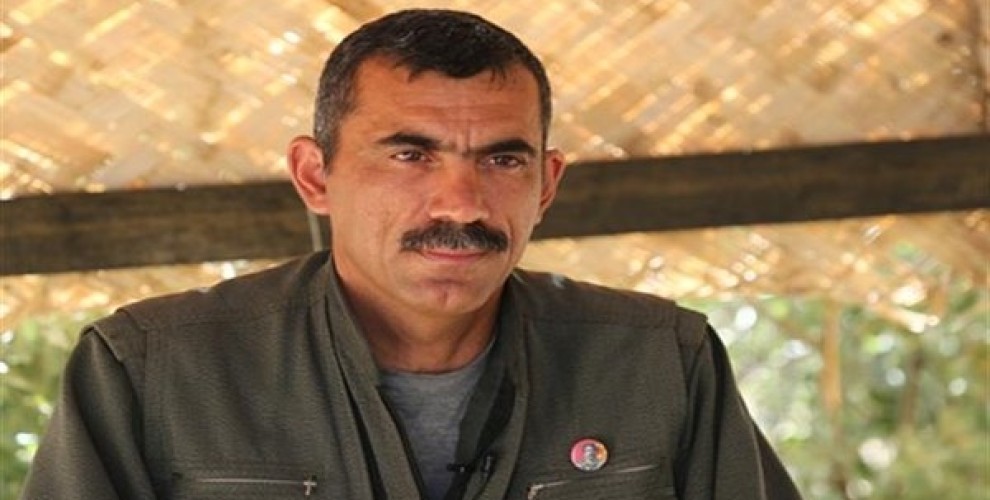PKK’s presence in Shengal is the guarantee for the Êzidî people
Egîd Kelar, one of the HPG commanders in Shengal, said their presence in the region is the guarantee for the Êzidî people’s freedom.
Egîd Kelar, one of the HPG commanders in Shengal, said their presence in the region is the guarantee for the Êzidî people’s freedom.

Tensions are still high in Shengal following KDP forces’ provocative attacks and increased weapons deployment. One of the HPG commanders in the region is Egîd Kelar. Speaking to ANF, Kelar stated that the Khanador attack was planned by Turkey, and that Ankara wants to implement their plans for the region through the KDP.
THE PLAN IN SHENGAL IS THE SUNNI FRONT’S PLAN
HPG commander pointed out that the plan to hand over Mosul, Tal Afar and Shengal to ISIS was made in meetings held in Qatar in 2013-14, and that Turkey and KDP are also part of these plans. Kelar said Turkey constantly supports ISIS, Al Nusra and Ahrar Al Sham gangs and makes deals so these forces will expand, and connected the handing over of Kelar, Tal Afar and Shengal to ISIS without a fight with this fact.
Kelar said the Kobanê resistance foiled many of the calculations made by these forces and added that the success of the YPG opened the door wide for a new period. He said Shengal was also liberated after the resistance there,noting that the Kurdish alliance had a role in these successful liberations and it was a first in history.
AKP IS TRYING TO ACHIEVE WITH OTHER FORCES WHAT THEY FAILED TO DO WITH ISIS
“Recently, the Turks have reverted back to their old policies. They want to ally themselves with Sunni Kurds, especially the KDP and forces close to them, and groups of Arabs and Turkmens, and thus achieve through these forces their goals that failed with ISIS. Even though the role the PKK played in the liberation of Shengal is known, today this is denied. They even say the PKK has to leave. YPG wants to launch the Raqqa operation but the Turks are doing all they can to prevent it. Because they are insistent on their old plans,” said Kelar and continued: “The idea of the Roj Peshmergas came from Davutoğlu. They trained these people in Bashiqa first, then they trained a force made up of Arabs named Heshdi Watani. After these, they trained KDP peshmergas. Who did they train against? The Kurds. This is the background of the Khanasor attack. What did they want to achieve? They wanted to attack Khanasor, which had been liberated by YBŞ/YJŞ forces before, and cross over to Rojava from there. It is talked about everywhere that Turkish soldiers in disguise as peshmergas will enter Shengal, Qandil, Kirkuk or Rojava. The perception in society is there already. This shows the level of relationship the KDP has formed with the Turks. Anybody who has a good grip on the events knows that the real planner behind the Khanasor attacks were the Turks. The Peshmerga were used as pawns, but Kurdish forces didn’t allow this to pass, and they will never allow Kurdistan to be part of a colony war.”
LATEST ATTACKS WERE VOIDED USING GUERRILLA TACTICS
HPG commander stated that the true target in the latest aerial attacks by the Turkish state has been Rojava and added: “Some of our positions may have been targeted, but the main target was Rojava, and foreign states had a role in this. Otherwise, both the US and Russia should have reacted very strongly. But as we understand from their approach, they have a part in this. They should support the no-fly zone demanded by the people of Rojava, because the Turks have not given up on their former dreams and they may cause trouble at any time.”
Kelar said they voided the latest attacks by the Turkish state using guerrilla tactics and expressed that the KDP’s language following the attack was the same as the Turkish state and the Turkish state is what they served with it. He also noted that the people’s reaction against the invading forces was strong.
HPG commander stressed that they will continue the struggle under the lead of the martyrs and said: “Of course we have given many valuable martyrs, and all the martyrs had one goal: To liberate the Êzidî society and the Êzidxan. Fulfilling their goal is a duty and a promise for us.”